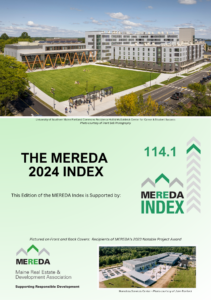June 25, 2024 at 6:00 am
·
Shelly Clark ·
Comments Off on The Right Equation for Responsible Development: Spotlight on University of Southern Maine Portland Commons Residence Hall and McGoldrick Center for Career & Student Success (Portland)
Each year, the Maine Real Estate & Development Association (MEREDA) recognizes some of the state’s most “noteworthy and significant” real estate projects, completed in the previous year. The exemplary projects from across the state, completed in 2023, not only embody MEREDA’s belief in responsible real estate development, but also exemplify best practices in the industry, contributing to Maine’s economic growth by significant investment of resources and job creation statewide.
This year, MEREDA honored projects from Portland to Gardiner to Presque Isle, with each receiving special recognition at MEREDA’s 2024 Spring Conference on May 15th.
In a multi-part series exclusive to the Maine Real Estate Insider, we’ll provide an up-close look at the most notable commercial development projects of the past year that are helping to fuel Maine’s economy in terms of investment and job creation. MEREDA is proud to recognize responsible development based upon criteria including environmental sustainability, economic impact, energy efficiency, difficulty of the development, uniqueness, social impact and job creation.
MEREDA’s 2023 Top 7 recipients include:
University of Southern Maine Portland Commons Residence Hall and McGoldrick Center for Career & Student Success, Capstone Development Partners (Portland)
Maine Savings Amphitheater, Waterfront Concerts, LLC (Bangor)
Phoenix Flats, Community Housing of Maine (Portland)
Homeless Services Center, Developers Collaborative (Portland)
Northeastland Hotel, Haley Ward, Inc. (Presque Isle)
Johnson Hall Opera House, Johnson Hall Redevelopment, LLC (Gardiner)
The Armature at Hanover Works, Reveler Development (Portland)
Please join us this week in celebrating USM Portland Commons Residence Hall and McGoldrick Center for Career & Student Success.

MEREDA: Describe the building and project.
This massive transformation of University of Southern Maine’s (USM) Portland campus included two connected facilities – the 218,000-square-foot, eight-story Portland Commons student residence and the 42,000-square-foot, five-story McGoldrick Center for Career & Student Success – both centered on a one-acre green quad.
The Portland Commons Residence Hall is home to undergraduates in their second, third, or fourth year; graduate students; law students; and residential staff with a mix of single-occupancy rooms, studio apartments, and larger apartments with multiple bedrooms and bathrooms. Amenities include a courtyard, a variety of study and meeting rooms, interior gathering spaces, and indoor bike storage.
The building has four wings, two reaching five stories in height and two reaching eight stories in height — forming a parallelogram that encloses the semi-private residential courtyard and maximizes access to natural daylight and views for living units.
This first-ever, on-campus, Portland-based residence hall for USM will provide affordable housing in a market where inventory is low and expensive, reduce competition for scarce housing with Portland residents, and alleviate overcrowding in the Gorham Campus residence halls.
The McGoldrick Center for Career & Student Success is a welcoming center of student life. The large scale of the building begins with the soaring south-facing Bath Savings Portico comprised of diagonal cross-laminated timber (CLT) columns to create a signature visual expression across the front façade. A broad gesture roughly 30 feet tall, 20 feet deep, and 200 feet long, the portico forms a “front porch” and covers a two-story mass timber-framed lobby. Enclosed entirely in a transparent curtain wall, this dramatic lobby is anchored by a monumental stone fireplace and soaring open stairs.
On the ground floor, the lobby is adjacent to a large dining common with a 254-seat capacity. The Double L Fireside Student Lounge, the University Store, and the Husky Brew provide more spaces to connect and study. The second floor is devoted entirely to career services, featuring the new home of the Career & Employment Hub with an office suite; a 4,500-square-foot multi-purpose room; private meeting rooms; and the Prentice Board Room. The top floor is devoted to Student Affairs, featuring the Student Diversity Center, with offices and various student lounge spaces.
These new campus facilities represent the pinnacle of sustainability and embraced renewable low-carbon building technologies, waste diversion, and strategies to maintain healthy living and working spaces. Portland Commons is the second largest Passive House residence hall in the United States and is projected to use 50% less energy than a standard modern building. The McGoldrick Center, with its large-scale 33.3-kW rooftop photovoltaic array and passive solar heating through a large south-facing glass façade, is pursuing LEED Gold certification. The building also incorporates corrugated metal and wood cladding materials, which are low carbon in their manufacture and shipping and can be recycled at the end of their long lifecycle. The facility is comprised of one-third mass timber and two-thirds structural steel framing, with low-carbon mass timber CLT and laminated lumber supports throughout as replacement for more carbon-intensive steel and concrete. Both buildings incorporate technologies such as energy-efficient lighting, water-efficient fixtures and daylight harvesting to further minimize impact.
MEREDA: What was the impetus for this project?
A 2019 Facilities Master Plan outlined a series of important planning and building initiatives to better prepare the University to attract and retain highly qualified students and faculty, transforming the local and state economies through scholarship, civic and cultural engagement, and innovation. The addition of new residential beds and a student center focused on career counseling and graduate success – both framing a new central quad – were the cornerstones of that master plan.
Fulfilling the aspirations of that master plan, the Portland Commons Residence Hall, McGoldrick Center for Career & Student Success, and L.L.Bean Green give the University a new campus heart that offers on-campus housing, dining amenities, and social and academic support spaces for all students. Surface parking that once occupied the site was relocated to a new garage, allowing the residence hall and student center to frame a large open lawn that has become the signature open space on the campus. With a design equally informed by all three pillars of sustainability, the new buildings and landscape enhance social equity with access and support for all; economic prosperity by providing compact, energy-efficient housing with a cost-effective price; and environmental stewardship by greatly reducing energy consumption through Passive House design, mass timber construction, and a renewable energy solar array on top of the McGoldrick Center.
MEREDA: That sounds like quite a process. How long were you in the planning stages before construction started?
PC Construction proposed with Capstone Development Partners on the project in July 2019 and were awarded the project in November 2019. The design-build planning process started in earnest in late December 2019. The original goal was to start construction in late summer 2020 but the pandemic impacted the preconstruction and design process and moved the construction start to March 2021. The planning process to delivery of the GMP was approximately 14 months.
MEREDA: Tell us about the most challenging aspect of getting this project completed.
Portland Commons and McGoldrick Center, plus a multi-level parking garage, were under construction by PC simultaneously on USM’s campus. Combined with the several other construction projects also underway in Portland, the availability of skilled tradespeople was a major challenge. To keep the USM projects on schedule, PC offset the work sequences for subcontractors to coordinate the needs of all three buildings without depleting each other’s resources.
Another challenge involved the relocation of the campus’s main steam line. The existing conditions differed from the as-builts, which required a redesign of the connections at either end of the steam line and the installation of a new condensate line. This unexpected work had to be completed before October 1 so that the campus heating system could be turned on for the winter season.
Lastly, the delivery of the prefabricated metal panels that formed the superstructure of Portland Commons became a supply chain issue, potentially putting the entire project schedule at risk. Electrical rough-in could not begin until the building was weather-tight, and since this delay would set back roof installation, the team made a major pivot to erect one wing at a time, rather than one floor of two wings at a time.
MEREDA: Something unexpected you learned along the way was….
Achieving Passive House certification could have been a lot more challenging than it turned out to be. Outstanding project teaming partners made certification possible.
MEREDA: Now that it’s complete, what feature of the project do you think makes it the most notable?
The expansive mass timber of the McGoldrick Center is impressive. Even though Maine is so well known for its extensive forestry industry, the trees in this area typically do not meet the structural requirements of mass timber. With one-third of the building comprised of mass timber, the building brings an exciting visual appeal while providing sustainable benefits. With Portland Commons, designing and constructing the second largest Passive House building at a university in the United States and a top-10 largest Passive House building anywhere in the country was incredibly exciting. This entire team will look back at the USM campus with pride for a long time to come.


 MEREDA has released its 18th edition of the MEREDA Index. As a key economic indicator for Maine, the MEREDA Index measures the pulse of the state’s real estate industry and is the leading way our industry tracks changes in Maine’s real estate markets.
MEREDA has released its 18th edition of the MEREDA Index. As a key economic indicator for Maine, the MEREDA Index measures the pulse of the state’s real estate industry and is the leading way our industry tracks changes in Maine’s real estate markets.


